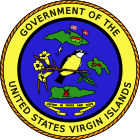 |
|---|
Politics of the United States Virgin Islands takes place in a framework of a presidential representative democratic dependency, whereby the Governor is the head of the territory's government, and of a multi-party system. United States Virgin Islands are an unincorporated and organized territory of the United States, administered by the Office of Insular Affairs of the United States Department of the Interior. Executive power is exercised by the local government of the Virgin Islands. The judiciary is independent of the executive and the legislature.
Virgin Islands residents are U.S. citizens but the territory has no electoral votes to cast for the president or vice president of the U.S. The territory participates in the nominating processes (caucuses).[1] Citizens cannot elect voting members of Congress. However, in the U.S. House of Representatives, they are represented by a delegate, who can vote in congressional committees but not in the House itself. Such delegates can speak on the U.S. House floor, introduce bills and offer amendments but cannot vote during business as the Committee of the Whole or on final passage of legislation. The USVI has been allowed to have non-voting representation since 1972.
- ^ "Presidential election in the U.S. Virgin Islands, 2016". Ballotpedia. Ballotpedia. July 1, 2016. Retrieved February 24, 2017.
© MMXXIII Rich X Search. We shall prevail. All rights reserved. Rich X Search
